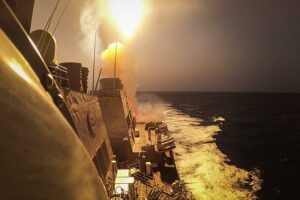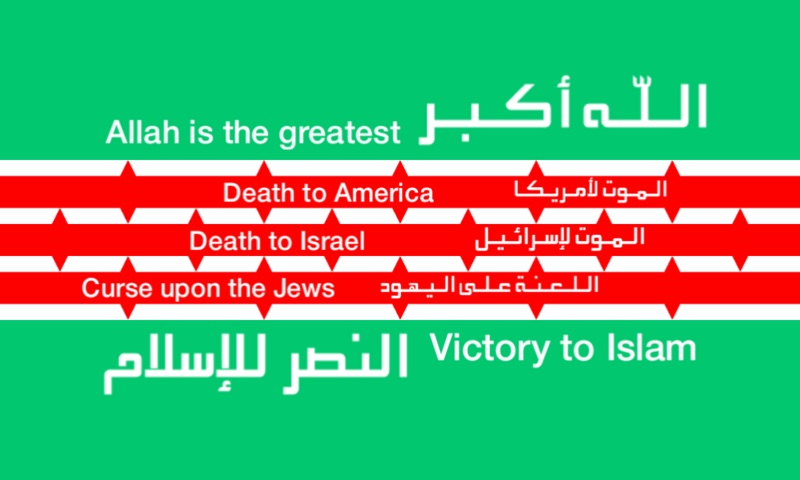Bayard & Holmes
~ Jay Holmes
In the wake of the Hamas terrorist attacks on Israeli citizens on October 7, people were left wondering how Israel could have been taken by surprise and how Hamas could be surprised at Israel’s response. In our first four articles, we look at different aspects of those questions See links below. Today, we review some external influences and players in this ongoing conflict.
Syria
In earlier decades, Syria would have loudly denounced anything that Israel did in relation to Gaza, the West Bank, or Lebanon. Syria’s current Dictator Assad is now more concerned with keeping himself alive another day than with denouncing Israel.

Syrian Pres. Assad with Russian Pres. Putin
Image from Website of the President of the Russian Federation
Wikimedia Commons CCA 4.0 Int’l
With Russia, Turkey, Iran, ISIS, Al Qaeda, the US, the Kurds, and various other, smaller groups constantly vying for position and influence in Syria, Assad and his much-depleted forces need to stay focused on survival. As a result, Syria can’t contribute much to the current Hamas/Hezbollah genocide against Israel.
Syria is dependent on Iran and Russia for its survival so it is obliged to make threats and denouncements. However, Syria’s latest threats were met by a promise from Israel that the Israeli Air Force would demolish the Damascus airport/air force base. Syrian Dictator Assad 3.0 absolutely needs that air base to continue functioning in order to keep himself alive and functioning.
In sum, Syria is not able to support either Hamas or Syria’s close friends in Hezbollah right now. That won’t change in the near future.
Hamas’ West Bank Competitors
Some of Hamas’s terrorist competitors in the West Bank, such as Palestinian Liberation Organization (PLO) splinter groups, Palestinian Authority puppet groups, and Hamas junior league puppets, have been actively attacking Israel since October 7. The Israeli responses have been swift and effective.

Israeli West Bank Barrier Near Ramallah
Image W. Hagens, public domain
Besides worrying about the IDF, those competing terrorist groups also have to worry about each other. Terrorist groups are as proliferous in the West Bank as trolls are on social media, and they all want the same money and followers. Each time a new one springs up, larger groups such as Hamas and the PLO have to decide whether or not to kill them or incorporate them. While they all have the mission of killing as many Jews and other non-Muslims as possible, none of these groups wants to expend all of its resources and manpower fighting the IDF and leave itself vulnerable to its jihadi competitors.
Collectively, however, they will continue to be a threat to Israel that will tie up a significant number of IDF forces. What life will be like in the West Bank after Israel feels it has done enough damage to Hamas in Gaza and Hezbollah in Lebanon remains to be seen. I’m guessing that in 2024, the West Bank won’t become a great place to live.
Russia
Vladimir Putin may often seem stupid and lacking in vision, but he is at least consistent in his lack of vision, and he is predictable. Vlady hates being predictable, but when the voices in your head only ever say the same things, you are bound to be predictable.
When it comes to Hamas and Israel, Putin desperately wants the war in Gaza and Israel to continue for as long as possible. A US dollar or artillery round sent to Israel cannot be sent to Ukraine. Russia also needs to support the Iranian agenda in the region. Without drones and electronic parts from Iran, Russia would be in even worse shape in its disastrous invasion of Ukraine. Russia will simply continue to hope for the worst in Gaza and Israel.
Iran
The war between Hamas and Israel is a wonderful thing for Iran. Iran is using this war as an opportunity to expand its influence in Iraq and Syria while building up its forces in Yemen via its Houthi errand boys. Iran’s terrorist teams in Iraq and Syria have attacked US troops in the area. Those proxy terrorist groups, along with Hezbollah in Lebanon, have paid a higher price for those attacks than anticipated, so Iran has shifted its main efforts to the Houthis.
The Houthis

Houthi flag
Wikimedia Commons, CCA 4.0 Intl
The Houthis in Yemen currently exercise immense influence on the Hamas-Israel war. The group has been involved in an ongoing war against the rest of Yemen and against Saudi Arabia. However, the Houthis’ larger, overreaching goal is for everyone to either become a Shia Muslim or die, and Houthi flags includes the phrases “Death to America,” “Death to Israel,” and “A Curse upon the Jews.”
The broader, non-tribal name for the Houthis is “Ansar Allah,” which translates to “supporters of God.” The Houthis, or “God’s little helpers,” are not the brightest folks in the world of Islamic terrorists. Unlike many Islamic terror groups, the Houthis seem to be inflexible and unimaginative, and the better-educated and more well-traveled members among them are always held in suspicion by the leadership. The Iranians involved with the Houthis do all they can to promote that outlook because they want to remain the principal influence over Houthi Jihadists.
What Ansar Allah lacks in vision and sophistication, it more than makes up for in Iranian funding, training, weapons, and leadership. Thanks to Iranian leadership, the Houthis have realized a tremendous growth spurt in membership by shifting their marketing efforts from their tribal fight in Yemen to world Islamic conquest. Estimates of their current membership vary wildly, but they may have more than 100,000 members. How many of their members are actually interested in actually fighting and how many simply see the Houthis as the current best source of groceries in Yemen is difficult to say.
As for other countries, to a lesser extent, Russia has supported the Houthis, as well. North Korea has backed the Houthis to the degree that it is willing to sell the Houthis weapons. The Eritreans have friendly relations with the Houthis, but they deny it. If the Houthis were wiped out, Oman would likely sit on the sidelines and breathe a sigh of relief while calling for peace. Without Iranian backing, the Houthis would soon be eradicated by their opponents in Yemen and the military forces of Saudi Arabia, Qatar, Kuwait, and the UAE. That makes it easy to predict that the Houthis will continue to do Iran’s bidding.

USS Carney engages Houthi missiles and unmanned aerial vehicles in the Red Sea on Oct 19, 2023.
U.S. Navy photo by Mass Communication Specialist 2nd Class Aaron Lau
Iran is currently using the Houthis to launch missile and drone attacks against shipping in the Red Sea. To reach or depart from the Suez Canal, ships must navigate through the Red Sea. Major shipping companies like Maersk have temporarily suspended its use of the Suez Canal and are rerouting their ships around Africa. This is a much slower and far more expensive trip. It is also a more time consuming trip, which means that a company’s cargo ship will be able to make fewer trips along the longer routes over time. This means that oil and other goods which normally pass through the Suez Canal will take longer to arrive and will be more expensive, as well.
This has already started to drive up the cost of petroleum. Any increase in the cost of petroleum is great news for both Russia and Iran. Russia is a major petroleum player, and it needs the money from petroleum to continue its invasion of Ukraine. Iran needs the money, and time, to invest in its nuclear weapons program.
As is the case with Russia, the Israeli-Hamas battles in Gaza are fantastic news for Iran. Iran will continue to push the Houthis to attack Red Sea shipping, and it will push Hamas and Hezbollah to glorious martyrdom in Gaza, the West Bank, and Lebanon. Martyrdom is a wonderful thing when you can get someone else to do it for you.
Europe
Europe’s Influence over the Israel-Hamas War could be immense, but most European politicians would normally prefer to limit themselves to slogans which they can update daily in response to current political fashions.
Europe is understandably focused on Putin’s invasion of Ukraine. Most Europeans, and Westerners in general, have little interest in Hamas and even less concept of what Hamas actually is. What Westerners and their politicians do understand is economic inflation.
One of the likely unintended consequences of the Iranian-Houthi missile and drone attacks on Western shipping is that Western countries are starting to become directly involved in the Red Sea issue and more concerned with the war in Gaza. For example, Spain, which had recently tried to limit itself to the usual “deep concerns” about humanitarian issues in Gaza, has now agreed to join a NATO-led maritime coalition to keep shipping open in the Red Sea. Several other European countries have joined in, as well.
The United States

NYC DSA/Jewish Voice for Peace
Wikimedia Commons CC0 1.0
Universal Public Domain Dedication
The US’s response to Hamas’s current war against Israel is complex, but it is not particularly surprising. As in Europe, those among the US left initially cheered for the war while Hamas was raping and murdering Israeli civilians and burning Israeli infants alive. However, once Israel was able to organize a counter-attack, these same leftist war-mongers shifted their passions and started screaming for an end to the violence. Now that Hamas is taking a beating, the usual suspects suddenly find themselves deeply concerned with the people of Gaza and think the Israelis can all drop dead. The US left is currently demanding a cease fire in Gaza and for the US government to stop supporting Israel.
At the same time, more groups of US Americans take a dim view of Hamas and other terrorists groups, and they are pressuring the US government to step up its support for Israel. Publicly, the current US administration will release a stream of statements about the urgency of a humanitarian cease fire, the need for a “two state solution,” and all the other usual political catch phrases.
The bottom line is that the US will continue to support Israel while pleading for “peace.”
The UN
If you chuckled when you read “UN,” you already know the answer. The UN will make no difference in the Hamas-Israel war. It has been expensive and useless for seven decades, and it is not going to change.
Conclusion
One part of the US and European response that is bound to quickly become more complicated is the West’s response to attacks on shipping in the Red Sea. Since this is an issue with its own momentum independent of the Hamas-Israel war, it deserves its own article.
In my opinion, with consideration for all the international factors at play in the Hamas-Israel war, the war will continue for several more months with varying degrees of intensity. When Israel is satisfied that it has sufficiently degraded Hamas’s capacity for large terror strikes from Gaza, it may well try, with international support, to set up a new and just-as-useless government in Gaza headed by non-Hamas Islamic factions. Israel then will likely conduct major air operations against Hezbollah.
That will officially “end” this chapter of the wars against Israel, but not for long. As long as there are groups of people who are willing to savage others to create the world in their own tiny image, there will be wars.
For previous articles in this series, see the following:

Recent Comments